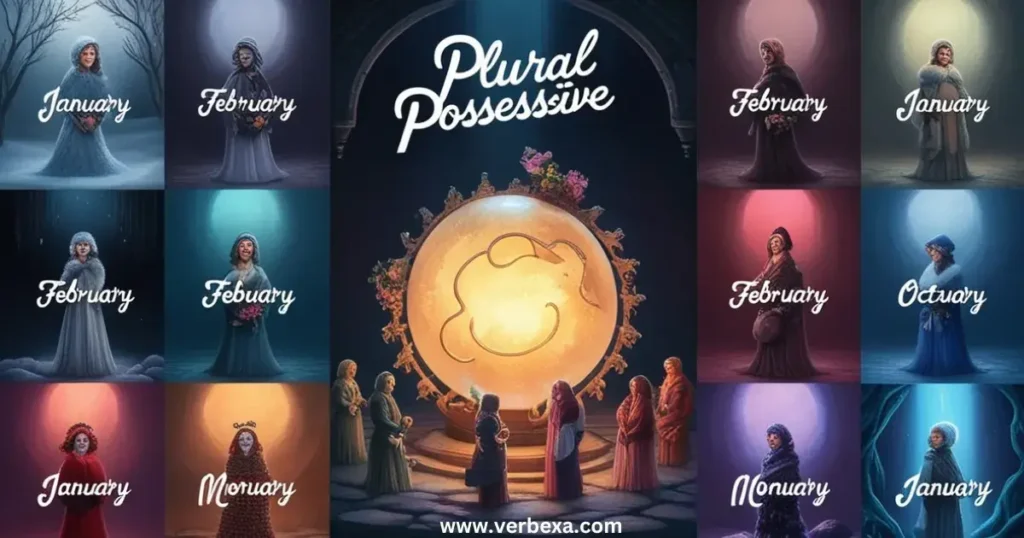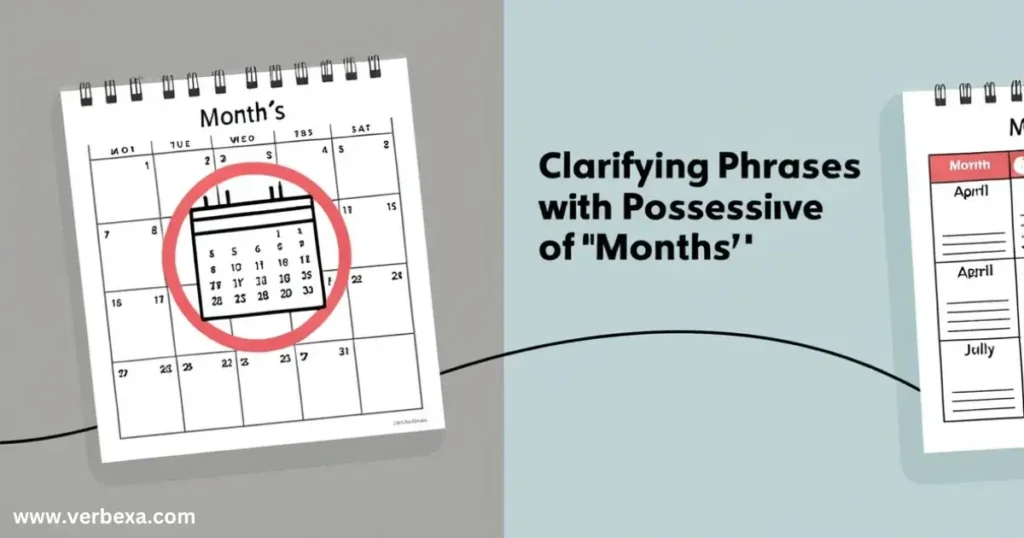When it comes to writing in English, small grammatical differences can often cause confusion. A prime example of this is the difference between month’s and months’. These terms might seem similar, but understanding their correct usage is crucial for clear and accurate writing. In this comprehensive guide, we will explore the difference between Month’s or Months’, provide actionable advice on when to use each, and illustrate these distinctions with practical examples. Whether you’re a student refining your writing skills or a professional seeking clarity, this article will help you master the possessive forms month’s and months’.
Why is This Confusion So Common?
The possessive apostrophe can be tricky in English, especially when it comes to terms like month’s and months’. The confusion arises because both forms are related to the concept of possession, but they indicate different types of ownership. Understanding the distinction between singular and plural possessives is key to grasping this grammar point.
Here’s a quick example to help you understand:
- Month’s – Refers to something belonging to one month.
- This month’s weather has been unpredictable.
- Months’ – Refers to something belonging to multiple months.
- After three months’ effort, the project was completed.
- Months – simple plural, no possession
As you can see, the apostrophe placement matters, and using the wrong form can lead to confusion. In this guide, we’ll break down the differences and provide you with clear examples of when to use each form.
Definitions and Usage: What Do These Terms Mean?
To fully understand the difference between month’s and months’, we need to examine their definitions and grammatical roles:
Month’s – Singular Possessive

The term month’s indicates possession or association with a single month. This is a singular possessive, and you add the apostrophe before the “s” to show that something belongs to one specific month.
Examples:
- One month’s salary is due next week. (Referring to the salary of a single month.)
- This month’s event was a success. (The event belonging to one month.)
Months’ – Plural Possessive

The term months’ indicates possession or association with multiple months. This is a plural possessive, so the apostrophe comes after the “s” to show that something belongs to more than one month.
Examples:
- Three months’ notice is required to cancel the subscription. (The notice associated with several months.)
- The research took several months’ time to complete. (The research time spanning over multiple months.)
In summary:
- Month’s = Singular possession (one month)
- Months’ = Plural possession (multiple months)
Synonyms for Month’s and Months’
Synonyms for Month’s:
- One month’s worth
- This month’s
- A month’s supply
- A month’s duration
- One month’s time
- Monthly
- A month of
- Single month
- Monthly allocation
- A month’s span
Months’ Synonyms:
- Several months’ worth
- Three months’ notice
- Months of
- Multiple months
- Several months’ time
- Many months
- A few months’ duration
- Multiple-month period
- Months’ experience
- A months-long span
Comparison Table: Month’s vs Months’
To help you visually compare month’s and months’, here’s a table that breaks down their definitions, usage, and common contexts:
| Form | Possession | Example | Common Contexts |
|---|---|---|---|
| Month’s | Singular Possession | This month’s rent is due tomorrow. | Refers to something specific to one month. |
| Months’ | Plural Possession | Three months’ preparation led to the success. | Refers to something belonging to multiple months. |
When to Use Each Term: Actionable Guidance

Now that we understand the definitions and usage of month’s and months’, let’s discuss when to use each form in different contexts. The key difference lies in whether you are referring to one month or multiple months.
Use “Month’s” When:
- Referring to one month in a specific context:
- This month’s newsletter features new updates.
- I only need one month’s time to finish the project.
- Talking about something that belongs to a specific single month:
- The rent for this month’s apartment is due on Friday.
- One month’s salary is enough to pay the bills.
Use “Months’” When:
- Referring to multiple months:
- After several months’ training, he was promoted.
- We agreed to a six months’ contract extension.
- Talking about something that belongs to a group of months:
- The months’ worth of data helped the team make informed decisions.
- After three months’ effort, the team finally reached their goal.
Everyday Usage Examples: Relatable Sentences
Let’s look at some everyday examples where you might encounter month’s and months’:
- Month’s:
- This month’s budget is tight, so we need to cut back on spending.
- I’m planning to take one month’s leave to travel.
- We only have one month’s worth of supplies left.
- Months’:
- The project took several months’ planning and coordination.
- We’re offering a three months’ free trial for new customers.
- It has been six months’ worth of hard work to get to this point.
As you can see, month’s is used when referring to something belonging to one month, while months’ refers to something belonging to multiple months.
Is “Month’s or Months’” Confusion Common in Other Contexts?

Yes, confusion between month’s and months’ is not limited to formal writing. This mistake often appears in casual or even professional settings, especially in business, contracts, and academic contexts. For example:
- “Month’s or Months’ Notice”:
- You need to give one month’s notice to terminate your lease.
- The company requires three months’ notice for contract cancellation.
- “Month’s or Months’ Worth”:
- We only have one month’s worth of food left.
- The research took several months’ worth of effort to complete.
Even phrases like this months or this month’s are often misunderstood:
- This month’s newsletter is out now.
- I’ll be gone in three months’ time.
Common Mistakes and How to Avoid Them
When it comes to using month’s vs. months’, many writers stumble on this small but important grammatical distinction. These mistakes can easily confuse readers or lead to incorrect interpretations, but with a little awareness, you can avoid them.
Incorrect Usage of Month’s and Months’
Here are some examples of common mistakes and how to correct them:
- “This months’ report” – The apostrophe is incorrectly placed after “months.” The correct form is “this month’s report” since we are referring to something belonging to a single month.
- “Two month’s notice” – The apostrophe after “month” is used incorrectly. The proper form is “two months’ notice”, as we are referring to a notice associated with two months.
Why These Mistakes Happen: Understanding When to Use Singular vs. Plural Possessive
The root of these mistakes often lies in a misunderstanding of the singular vs. plural possessive forms. English can be tricky when it comes to possession, especially when dealing with time-related nouns like month. The rules can feel confusing because some people instinctively assume that adding an apostrophe after the “s” makes it possessive, regardless of whether it’s singular or plural.
- Month’s = Singular Possessive – Referring to something related to just one month.
- Example: “This month’s deadline is next Friday.”
- Months’ = Plural Possessive – Referring to something belonging to multiple months.
- Example: “After three months’ worth of hard work, the project was finally completed.”
Tips for Avoiding Confusion
To avoid making mistakes with month’s and months’, here are some helpful tips:
- If talking about one month, use “month’s”:
- If you’re referring to something that belongs to a single month, add the apostrophe before the “s.”
- Example: “This month’s budget is almost spent.”
- If you’re referring to something that belongs to a single month, add the apostrophe before the “s.”
- If referring to several months, use “months’”:
- When referring to more than one month, place the apostrophe after the “s” to indicate possession by multiple months.
- Example: “I’ll need three months’ worth of data to complete this analysis.”
- When referring to more than one month, place the apostrophe after the “s” to indicate possession by multiple months.
By remembering these simple rules, you can easily decide which form to use in any given situation.
Clarifying Phrases with Month’s and Months’

Even beyond the basic rules, understanding the correct phrases to use can help solidify your grasp of possessive forms. Let’s explore some commonly confused phrases:
Common Phrases Explained:
- “One month’s notice” vs. “Three months’ notice”
- One month’s notice refers to notice that belongs to a single month (e.g., “I gave one month’s notice to my landlord”).
- Three months’ notice refers to notice spanning multiple months (e.g., “The company requires three months’ notice before you can cancel your membership”).
- “Month’s time” vs. “Months’ time”
- One month’s time indicates a time period of one month (e.g., “I will finish the project in one month’s time”).
- Months’ time refers to a period of multiple months (e.g., “In three months’ time, we’ll know the results”).
- “Month’s salary” vs. “Months’ worth of savings”
- Month’s salary refers to the salary for one month (e.g., “His month’s salary was deposited today”).
- Months’ worth of savings refers to savings accumulated over several months (e.g., “She had saved up a few months’ worth of living expenses”).
- “This month’s expenses” vs. “Last months’ income”
- This month’s expenses refers to the expenses of the current month (e.g., “This month’s expenses are higher than expected”).
- Last months’ income is incorrect—use “last month’s income” since we’re referring to a single month. The correct form for multiple months would be “last months’ income” (e.g., “The company reported last months’ income across several regions”).
Real-Life Usage Examples in Conversation and Writing
Now that we’ve covered the basics, let’s look at real-life examples where you might encounter month’s and months’ in both professional and everyday communication.
Common Phrases in Professional Writing:
- “The project will take one month’s time to complete.”
- This is a common phrase in business or project management where a specific time frame (one month) is needed to finish a task.
- “I’ve given three months’ notice to my landlord.”
- A common example of giving advanced notice in business contracts, leases, or professional settings where multiple months are involved.
Real-Life Contexts:
Whether you’re writing an email, drafting a business contract, or preparing a report, the possessive forms of month come up in various contexts. Here’s how to use them correctly in business, contracts, and personal communication:
- Business:
- “The report for this month’s meeting is almost ready.”
- “We need to finalize the budget for the next three months’ marketing campaign.”
- Contracts:
- “The employee agreed to a one month’s probation period.”
- “Please provide two months’ notice before termination of the agreement.”
- Personal Communication:
- “I can only take one month’s vacation this year.”
- “We need to discuss the three months’ rent in advance.”
By understanding these examples, you’ll be able to navigate everyday writing with confidence and avoid making mistakes with possessives.
Additional Grammar Insights: Is It “Month’s” or “Months” in These Phrases?
Sometimes the confusion also arises in phrases that involve month and months without possessive forms. Let’s look at a few examples where people often make mistakes:
“12 Month” vs. “12 Months”
- The phrase “12 month” should always be “12 months” because it refers to a plural quantity.
- Correct: “A 12-month subscription costs $100.”
- Incorrect: “A 12 month subscription costs $100.”
“Men’s Health Month June or November?”
- Men’s Health Month is observed in June, not November. This can cause confusion, especially when people see the term “months’” or “month’s” used in conjunction with health campaigns.
Example in context:
- Is men’s mental health month June or November?
- Answer: Men’s Mental Health Month is typically observed in June, not November.
“In a Month’s Time” vs. “In a Months’ Time”
- When talking about a specific amount of time (e.g., one month), use “in a month’s time”. If referring to multiple months, use “in several months’ time”.
- Correct: “The project will be completed in a month’s time.”
- Incorrect: “The project will be completed in a months’ time.“
Membership Questions
- “Is Sam’s Club membership monthly or yearly?” (Sam’s is singular possessive)
- Answer: Sam’s Club typically offers yearly memberships
By paying attention to these grammar insights, you can ensure that your writing is both grammatically correct and easy to understand.
FAQs
Is it “12 month or 12 months”?
“12 months” is correct (simple plural, no possession needed)
Is it months time or month’s time?
The correct phrase is “month’s time” when referring to a period of one month. For multiple months, use “months’ time.”
Is it month’s notice or months notice?
“Months’ notice” is correct when referring to notice given for multiple months. Use “month’s notice” when referring to a single month.
Is it month’s or months rent?
The correct term is “month’s rent” when referring to rent for one month, and “months’ rent” for rent spanning multiple months.
Is “in a month’s time” correct?
Yes, “in a month’s time” is correct when referring to a period of one month. For multiple months, use “in months’ time.”
Does this month’s have an apostrophe?
Yes, “this month’s” includes an apostrophe to indicate possession, referring to something belonging to the current month.
Conclusion: Mastering the Month’s vs. Months’ Difference
To sum up, distinguishing between month’s and months’ is essential for clear, precise writing. The key difference lies in the possessive form—whether you’re referring to one month (month’s) or multiple months (months’). By understanding these possessive rules, you can avoid common grammatical mistakes and improve your writing skills.
When writing, remember to:
- Use month’s when referring to something belonging to one month.
- Use months’ when referring to something belonging to multiple months.
With these guidelines in mind, you can confidently navigate this grammar challenge and enhance your writing clarity. Whether you’re drafting a business email, writing an academic paper, or just sharing your thoughts in a blog, mastering the use of possessives like month’s and months’ will take your writing to the next level.
So, next time you find yourself asking, “Month’s or months’?”, you’ll know exactly which form to choose.

This author is a passionate linguist and grammar enthusiast, dedicated to helping individuals master the art of language. With years of experience in teaching and editing, she brings clarity and precision to every sentence. Tina’s mission is to empower writers of all levels to express themselves with confidence and excellence.

![Month’s or Months’ – Differences + Examples + Table [2025 Update]](https://verbexa.com/wp-content/uploads/2025/01/months-or-months-differences-examples-table-2025-update.webp)